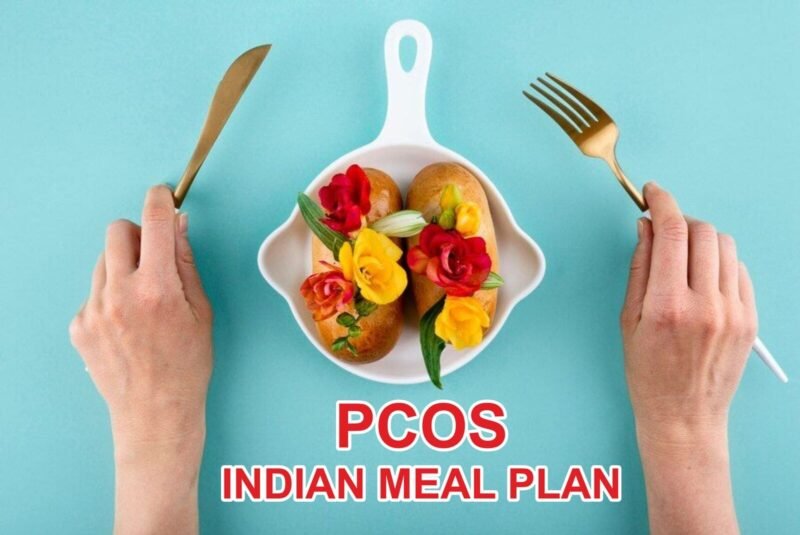
Most women are well aware of PCOS (Polycystic Ovary Syndrome), which is a type of hormonal disorder in menstruating women. Weight gain is a common side effect, and managing it with the Indian meal plan can help improve the condition.
PCOS results in several symptoms such as irregular menstrual cycle, chronic inflammation, increased body hair, and other hormonal abnormalities, such as the surge of testosterone. Combining some physical activity and meditation with a perfect PCOS Indian meal plan is the only way to achieve your weight loss targets.
Here’s how traditional Indian recipes can help in managing the PCOS Condition:
– Whole Grains
Intake of whole grains such as brown rice, wheat, ragi, Daliya, Barley, and Oats is a staple in the PCOS Indian diet chart. Their high fiber and complex carb components aid in a better digestion process.
– Pulses
Pulses like chana dal, moong dal, chickpeas, dried beans, and other options also prove helpful in balancing insulin levels and lowering GI levels.
– Lean Proteins
Proteins also play a crucial part in creating a hormonal symphony for people dealing with PCOS. Including protein sources like tofu, egg, curd, fish, skimmed milk, and chicken can also help you get relief from PCOS acne.
– Fresh Veggies
Adding lots of fresh and leafy vegetables such as carrots, beans, bottle guard, and broccoli aids in slowing down the digestion process and dealing with the process of insulin resistance. You can either consume these veggies in the form of salads, stews, or cooked curries for the best of health.
– Fresh Fruits
Intake of fresh fruits such as berries, melons, papaya, pomegranate, apples, and other citrus fruits helps in curbing sweet cravings without compromising health. They are packed with essential antioxidants, minerals, and fibre as well.
– Herbs and Spices
Intake of specific herbs and spices like ginger, turmeric, mint, clove, basil, cinnamon, and fenugreek can also aid in managing PCOS symptoms and offer numerous health benefits.
– Seeds and Nuts
Try to take in a limited quantity of sesame seeds, almonds, walnuts, and flaxseeds in your PCOS diet plan. Enjoying a bowl of fresh fruit with some toppings is also a great idea.
It is advisable to consult your nutritionist for an exact distribution of macronutrients in your meals. They can help you frame a perfect diet chart to meet your requirements. Experts recommend a 1200-1300-calorie diet for individuals. It should consist of:
Carbohydrates: 60-65%
Proteins: 20-25%
Fats: 15-18%
Monday
Breakfast: 1 bowl of Ragi Porridge with 1 Boiled Egg
Snacks: 4-5 Walnuts
Lunch: 1 Cup of brown rice with one bowl of dal and any green leafy vegetable, or one bowl of veggie curry
Evening Snack: A bowl of Pumpkin, sunflower seeds, or a glass of smoothie
Dinner: Sauteed chicken with mixed veggies and a glass of buttermilk.
Tuesday
Breakfast: 1 Millet Dosa with green chutney, along with a cup of tea or coffee without sugar
Snacks: 1 Orange along with flax seeds
Lunch: 1 small bowl of dal with 1 Multigrain roti, 1 cup of vegetables, and salad.
Evening Snack: Tomato soup with a few almonds and one glass of buttermilk.
Dinner: 1 bowl of Kadhi with 1 Millet roti and a few green leafy vegetables
Wednesday
Breakfast: 1 small plate of upma or daliya with lots of vegetables, along with a cup of coffee or tea
Snacks: 1 cup of green tea with a small bowl of any fruit
Lunch: 1 small plate of brown rice pulav along with the vegetable raita
Evening Snacks: 1 Bowl of sprouts bhel along with a glass of apple smoothie
Dinner: 1 Bowl of egg curry/paneer curry with one multigrain roti and curd
Thursday
Breakfast: 2 Idlis with Sambhar and a cup of tea/coffee without sugar
Snacks: 1 small bowl of oats with curd and some fruits
Lunch: 1 Methi Thepla with curd, salad, and a vegetable curry
Evening Snack: boiled egg/ Pumpkin with carrot soup, and some sunflower seeds
Dinner: 1 bowl of brown rice along with mushroom curry and one small bowl of curd with some salad.
Friday
Breakfast: 1 Bowl of Oats Porridge with some toppings of fruits
Snacks: 1 cup of wheat/Jowar puffs with a glass of buttermilk
Lunch: 1 Multigrain Roti with one bowl of dal, one bowl of vegetables, and some salad.
Evening Snack: 1 Bowl of chana masala with a cup of coffee/tea without sugar
Dinner: Okar/Dal Curry with a bowl of brown rice and grilled eggplant
Saturday
Breakfast: Veg Oats Upma along with a cup of tea/coffee
Snacks: 1 Cup of Green Tea with a handful of nuts or almonds
Lunch: 1 Multigrain roti with a bowl of dal, along with 1 cup of mixed vegetables and raita
Evening Snack: Sunflower seeds, one bowl of sprout salad, and a cup of Pumpkin
Dinner: Broccoli almond soup with some sautéed Tofu, Fish, Chicken, and vegetables
Sunday
Breakfast: Vegetable Upma with a Glass of Fresh Fruit Juice
Snacks: 1 boiled egg
Lunch: 1 Bowl of Brown Rice with a cup of Rajma and vegetable raita
Evening Snack: Nuts, Sunflower seeds, buttermilk, and 1 Guava
Dinner: Grilled Paneer/Fish with Spinach Soup and sautéed vegetables
Along with a healthy diet and mindful eating practices, complement 150 minutes of intense physical workouts to manage your weight. Stay hydrated and increase intake of green juices as they reduce the PCOS symptoms.
It is not possible to cure PCOS, but you can control its symptoms by keeping the above things in mind. Do not skip consulting a specialist as they are the best ones to guide with the tailored PCOS Indian diet plan.